#how can we fix medicare
Explore tagged Tumblr posts
Text
A taxonomy of corporate bullshit

Next Tuesday (Oct 31) at 10hPT, the Internet Archive is livestreaming my presentation on my recent book, The Internet Con.

There are six lies that corporations have told since time immemorial, and Nick Hanauer, Joan Walsh and Donald Cohen's new book Corporate Bullsht: Exposing the Lies and Half-Truths That Protect Profit, Power, and Wealth in America* provides an essential taxonomy of this dirty six:
https://thenewpress.com/books/corporate-bullsht
In his review for The American Prospect, David Dayen summarizes how these six lies "offer a civic-minded, reasonable-sounding justification for positions that in fact are motivated entirely by self-interest":
https://prospect.org/culture/books/2023-10-27-lies-my-corporation-told-me-hanauer-walsh-cohen-review/
I. Pure denial
As far back as the slave trade, corporate apologists and mouthpieces have led by asserting that true things are false, and vice-versa. In 1837, John Calhoun asserted that "Never before has the black race of Central Africa, from the dawn of history to the present day, attained a condition so civilized and so improved, not only physically, but morally and intellectually." George Fitzhugh called enslaved Africans in America "the freest people in the world."
This tactic never went away. Children sent to work in factories are "perfectly happy." Polluted water is "purer than the water that came from the river before we used it." Poor families "don't really exist." Pesticides don't lead to "illness or death." Climate change is "beneficial." Lead "helps guard your health."
II. Markets can solve problems, governments can't
Alan Greenspan made a career out of blithely asserting that markets self-correct. It was only after the world economy imploded in 2008 that he admitted that his doctrine had a "flaw":
https://www.pbs.org/newshour/show/greenspan-admits-flaw-to-congress-predicts-more-economic-problems
No matter how serious a problem is, the market will fix it. In 1973, the US Chamber of Commerce railed against safety regulations, because "safety is good business," and could be left to the market. If unsafe products persist in the market, it's because consumers choose to trade safety off "for a lower price tag" (Chamber spox Laurence Kraus). Racism can't be corrected with anti-discrimination laws. It's only when "the market" realizes that racism is bad for business that it will finally be abolished.
III. Consumers and workers are to blame
In 1946, the National Coal Association blamed rampant deaths and maimings in the country's coal-mines on "carelessness on the part of men." In 2003, the National Restaurant Association sang the same tune, condemning nutritional labels because "there are not good or bad foods. There are good and bad diets." Reagan's interior secretary Donald Hodel counseled personal responsibility to address a thinning ozone layer: "people who don’t stand out in the sun—it doesn’t affect them."
IV. Government cures are always worse than the disease
Lee Iacocca called 1970's Clean Air Act "a threat to the entire American economy and to every person in America." Every labor and consumer protection before and since has been damned as a plague on American jobs and prosperity. The incentive to work can't survive Social Security, welfare or unemployment insurance. Minimum wages kill jobs, etc etc.
V. Helping people only hurts them
Medicare will "destroy private initiative for our aged to protect themselves with insurance" (Republican Senator Milward Simpson, 1965). Covid relief is unfair to people that are currently in the workforce" (Republican Governor Brian Kemp, 2021). Welfare produces "learned helplessness."
VI. Everyone who disagrees with me is a socialist
Grover Cleveland's 2% on top incomes is "communistic warfare against rights of property" (NY Tribune, 1895). "Socialized medicine" will leave "our children and our children’s children [asking] what it once was like in America when men were free" (Reagan, 1961).
Everything is "socialism": anti-child labor laws, Social Security, minimum wages, family and medical leave. Even fascism is socialism! In 1938, the National Association of Manufacturers called labor rights "communism, bolshevism, fascism, and Nazism."
As Dayen says, it's refreshing to see how the right hasn't had an original idea in 150 years, and simply relies on repeating the same nonsense with minor updates. Right wing ideological innovation consists of finding new ways to say, "actually, your boss is right."
The left's great curse is object permanence: the ability to remember things, like the fact that it used to be possible for a worker to support a family of five on a single income, or that the economy once experienced decades of growth with a 90%+ top rate of income tax (other things the left manages to remember: the "intelligence community" are sociopathic monsters, not Trump-slaying heroes).
When the business lobby rails against long-overdue antitrust action against Amazon and Google, object permanence puts it all in perspective. The talking points about this being job-destroying socialism are the same warmed-over nonsense used to defend rail-barons and Rockefeller. "If you don't like it, shop elsewhere," has been the corporate apologist's line since slavery times.
As Dayen says, Corporate Bullshit is a "reference book for conservative debating points, in an attempt to rob them of their rhetorical power." It will be out on Halloween:
https://bookshop.org/a/54985/9781620977514

If you'd like an essay-formatted version of this post to read or share, here's a link to it on pluralistic.net, my surveillance-free, ad-free, tracker-free blog:
https://pluralistic.net/2023/10/27/six-sells/#youre-holding-it-wrong
#pluralistic#corporate bullshit#lies#books#reviews#taxonomies#labor#denialism#consumerism#Nick Hanauer#Joan Walsh#Donald Cohen#history#object permanence#taking the right seriously
840 notes
·
View notes
Text
Kamala Harris deserved to lose.
That’s a controversial statement, so let me get something out of the way right out the gate: I am not a Trump supporter. I fucking hate Trump’s racist, misogynistic, homophobic, transphobic, fascist guts, and I will until the day I die. I voted for Harris, I volunteered for her campaign and several other local campaigns in my area. I did everything a politically active person should do to participate in our democracy.
And yet I, and anyone who was paying attention knew how this election was going to go ahead of time, for one very simple reason. What were Kamala Harris’s policy positions? What did she actually run on? What did she say she was going to do differently? Building a million homes for working-class people who have had their salaries so undercutted by inflation and price hikes that they can no longer afford the kind of long term saving required for that? Increase child tax credits when grocery prices are so high that nobody can afford another mouth to feed? Raising taxes on billionaires? She’s the Vice President of the current administration, why are they not already being taxed? And furthermore, where is that tax money going? Clearly not Medicare for All, or Student Debt Relief, or anything that could actually constitute benefits for the average citizen.
Discussing which demographics are “responsible” for electing Trump is a fucking stupid discussion, and anyone engaging in it should feel absolutely fucking ashamed at buying into more crap that the oligarchs put up to divide us. Except for a few exceptions, the demographics were coin-flip toss ups. What happened was that Kamala Harris lost 15 million votes. Not to Trump, but to apathy. Trump got 3 million less votes than he did in 2020, and still won, because people didn’t vote for Harris. The battle was in voter turnout, like we always knew it would be, and the Democratic Party lost it. Why?
Because Kamala Harris ran, like Biden did, on being the anti-Trump. And regardless of whether or not you think that the Democrats are responsible for current woes, (and I do not,) that's not a winning strategy when the "Anti-Trump" is the one in power. Being the Anti-Trump isn't a policy position. It's not a solution to anyone's issues. It's merely a hope that people think Trump is worse, and as we've seen, regardless of whether or not it should, that does not win elections. When gas prices or grocery bills are so expensive people can barely afford to survive, saying "Well, those will be worse under Trump," is not a solution. It does not provide confidence that she has plans to fix the issues. It is a shrug of the shoulders, and a dismissal, and that's why so many people stayed home.
In 2020, when the problems could be blamed on Trump without any sort of understanding of the complex issues that caused the problems, because Trump was simply the one in power and The President's Job Is To Fix Everything, so being Anti-Trump worked. When Democrats have been in the white house for four years, and people feel like the problems still aren't fixed, they lose confidence that the democrats will fix the problem, so they don't vote.
When food prices are spiking, you don't say, "The other guy will make it worse," because that's what any candidate would say, and it's not particularly different than just purely mudslinging, and its a claim that Trump will deny vehemently, so you can't win that argument. What you need to say is "I'll subsidize agriculture," or, "I'll increase the accessibility and power of food assistance programs." Regardless of whether or not those things would actually work, what they are is some kind of solid plan to actually fix the fucking problem. It's said that people don't vote on policy, and that's true a lot of the time, or at least more than it should be, but people do vote on confidence, and having policy of any kind builds that confidence. Regardless of what you think of Trump, the man has plenty of plans to implement policy. It's terrible, awful, nation destroying policy, but that's getting into the details and the facts, and that's where the voters' eyes glaze over and they stop listening to you. The fact that Trump has plans to change the status quo and Harris does not is how she lost this election.
When the status quo is untenable, people will vote for whatever breaks it, and that wasn't Harris.
It also doesn't help that Harris has pretty much refused to significantly differentiate herself from Joe Biden, who has plenty of his own problems, and again, is the status quo. Joe Biden refused to step aside and relegate himself to being a single term president because of his personal pride, and the Democrats absolutely refused to consider not backing him until he was forced to step aside when his problematic degradation was put on full display for the entire country to see and mock. Then, instead of holding an actual primary, where voters could choose who they wanted to see on the Democratic ticket, they decided to simply coronate Kamala Harris, a historically unpopular candidate with historically low approval ratings, and force anyone who was against Trump to rally behind a candidate they didn't choose and statistically speaking don't like. Is it any wonder that her ticket hemorrhaged 15 million votes from 2020? That's before getting into her incredibly strange choices during her campaign, from again having essentially no policy positions, to picking a Tim Walz, who while being imo a good person, is from an entirely blue state and not a swing state, and has neither experience running against serious mainline GOP candidates, nor any real nationwide appeal beyond his personality, and we've already established that vibes don't turn out voters.
Kamala Harris, and on a larger scale the Democratic Party, deserved to lose this election because they have almost entirely abandoned any sense of being the progressive option. They've completely abandoned the progressive wing of their party, because who else are they going to vote for? Trump?
I don't like being the guy who says, "Harris hasn't earned the votes," because if you didn't vote, fuck you, you're nearly as culpable in this as the MAGAts, but is it any wonder why progressives are abandoning the democrats? After being ignored, fucked over time after time for nearly a decade at this point, literally screaming and begging for people to care about genocide, fascism, and the literal end of the world and getting a pat on the head and a vote sticker, what the fuck else did anyone expect? Harris cozied up with Liz Cheney and tried to court the votes of a few thousand moderate republicans, while tens of millions of progressive votes were expected, and then you're all trying to to blame them when those votes don't come? Shame, shame on you, ye moderate democrats who'd rather get into bed with the center-right than any kind of progressive, you get what you fucking deserve.
Normally, I'd laugh at establishment democrats fucking around and finding out, but this time, it's not just them finding out, it's the whole of America finding out with them. I don't really have any advice, because I'm just as shattered as anyone else. Hunker down, spend time with your loved ones, and maybe learn how to use a gun in case some neo-nazi decides to try to hate-crime you. I'm hoping that the Democrats learn their lessons from this, but honestly at this point, I'm not sure they're capable of learning, if there'll even be a democratic party to speak of come 2028. Right now, I'm gonna go stare at the election results and feel my faith in humanity crack a little bit more.
#us elections#kamala harris#donald trump#politics#us politics#election 2024#jd vance#democrats#republicans
39 notes
·
View notes
Text
Okay so here's the deal--I know Tumblr likely isn't a microcosm of the Democratic party because I remember people freaking out in 2020 over Joe Biden being the nominee and guess what? He won despite people freaking out.
HOWEVER
That was 2020, where Democrats somehow managed to turn Georgia blue and surprised the GOP. We can not assume we will be able to repeat such a feat unless we get out and campaign for Biden.
Donate, volunteer for phone banks, put up a yard sign/car decal (if it's safe), hell even making these posts to try to reach more people can help. Biden's team has reached out to TikTokers for assistance in getting people out to vote and before we call him 'cringe' for that, I'd like to remind you guys that the reason Obama won the 2008 primary over HRC was in part to his utilization of social media. TikTok is the newest form of social media.
If you are an American, I beg you to please vote and please vote BLUE down the ballot. Because I read a bit of Project 2025 and it is not hyperbole to say that if Trump wins and the GOP gains the House and Senate, the United States is looking at an authoritative regime we have never seen before.
Vote for your fellow citizens who are currently relying on Medicare and/or Medicaid for assistance.
Vote for your fellow citizens who rely on Social Security benefits to survive (or you know, vote because you'd one day like to see those benefits you're paying into).
Vote for your fellow citizens who might get swept up into camps if they can't prove they're a citizen if asked (and before anyone accuses me of being hyperbolic, internment camps are listed in Project 2025)
Vote for your fellow citizens who would be impacted by a national abortion ban.
Vote for your fellow citizens who's hard-fought rights would be thrown into the garbage disposal.
VOTE BECAUSE OF THE FACT THAT WE CURRENTLY HAVE A SCOTUS MAKING THINGS UP AS THEY GO. THERE IS NO MENTION OF PRESIDENTIAL IMMUNITY IN THE CONSTITUTION YET SCOTUS GAVE THE PRESIDENT IMMUNITY WHILE AT THE SAME TIME, SCOTUS THREW OUT ROE BECAUSE ABORTION IS NOT MENTIONED IN THE CONSTITUTION!
Look I get that Biden gives some people the ick and I understand that we won't agree on everything but can we agree on the importance of SCOTUS?
If you truly need a reason to hold your nose and vote Biden, the Supreme court, and the possibility of three seats opening with Alito, Thomas, and Roberts being in their 70s should be that reason.
If you are afraid of Biden dying in office, we have a plan for that. it's called the Office of the Vice President. And yes, Kamala's a woman and a former DA and whatever else you want to say about her but she also exists. Trump has not named a VP and he is 3 years younger than Biden. And that should scare you because the next in line should Trump die in office would be the SPEAKER OF THE HOUSE. Which might not mean much if we somehow take the House but Trump gets re-elected but we all know that won't happen.
I have lived in this country for 30 long years. I witnessed how people accidentally voting for Pat Buchannan along with purposefully voting for Nader and a SCOTUS stepping in when they should have recused themselves gave us Bush over Gore in 2000. I saw how people voting for Stein gave us Trump over HRC. I need you to believe me when I say this: if you vote for the Green Party or any independent progressive party instead of voting for Biden in November, you are effectively voting for Trump because that is how our system is designed. And I can almost guarantee that if Trump steps foot back into the Oval Office, there will not be a 2028 election to try to fix the mess he is going to create.
#us politics#american polictics#vote blue#vote biden#vote democrat#please just hold your nose and vote Biden in November if you want a chance at moving forward and having the chance to change#Remember how we were all terrified of Sarah Palin running the country if McCain died in office?#Can we please just imagine Trump as the male version of Palin?#Whatever you need to do to vote blue in November
24 notes
·
View notes
Text
Almost one in five Americans over age 65 are unable to manage basic activities of daily life—bathing, dressing, eating, toileting—without assistance. Among those over age 85, the proportion is closer to half. Friends and family members can and do help out, but even so, about half of people reaching the age of 65-years of age will use paid long-term services and supports (LTSS) at some point. Most Americans do not have enough income or savings to cover these costs. The private long-term care insurance industry has never worked well despite many creative efforts to fix it and to encourage enrollment. The Federal Medicare program covers only short spells of home care after a hospitalization and does not provide coverage for long-term support. That leaves Medicaid. Medicaid offers a critical long-term care safety net for people who get their healthcare primarily through Medicaid—but it isn’t a good solution for most Medicare beneficiaries as it doesn’t align with the system that manages their care and pays their providers. Moreover, eligibility for Medicaid is restricted to those with very low incomes and few assets, so few older adults qualify. It is well past time to add a universal home care program to Medicare itself.
Prior efforts to move in this direction have been stymied. Some proponents have called for a universal, open-ended benefit. Critics have argued that any universal home care benefit would be a budget buster. These tensions are ubiquitous in social program design. An additional tension in designing a program that serves people towards the end of their lives is that public funds should be focused on expanding access to necessary care rather than protecting the ability of people to leave large bequests to their children. Designing a fiscally responsible, universal benefit that does all that is a challenging task—but we believe it is not an impossible one. In this post, we describe some design options for a Medicare home care benefit that could be dialed up or down depending on the priority assigned to program generosity or fiscal feasibility.
Several features make designing a universal home care benefit challenging.
The need for home care is based on measures of functioning, not lab tests. A program must have simple and reliable ways to measure who needs care and how much care they need.
Most people report a preference for care in their own homes over that in nursing homes or other institutional settings. This is because, unlike medical care, which is often unpleasant and painful, home care typically provides support, comfort, and a degree of safety for beneficiaries. One consequence of these preferences is that a home care benefit would be susceptible to overspending. The program will need to have measures in place to avoid overuse.
Income alone is a poor indicator of how much Medicare beneficiaries can afford to pay for home care. For example, beneficiaries who are renters may depend on their incomes to afford housing; other beneficiaries may have very large, non-liquid assets but limited incomes, leaving them ineligible for Medicaid programs while unable to pay for care. Program design will have to address the importance of assets in this population.
Much LTSS is provided through informal care. Beneficiaries often prefer care provided by family members, but paying for informal care raises the potential for overspending, fraud, and exploitation of older adults.
State Medicaid programs currently cover the cost of home care for 4.2 million people, according to KFF, though eligibility and costs vary considerably across the country. Medicaid would continue to provide home and community-based services for people who are not Medicare beneficiaries. Some of this spending could be redeployed by states to improve the quality of nursing home care and for home and community-based services for people who are not eligible for Medicaid. The federal share of Medicaid savings could be used to defray the costs of a new Medicare home care program.
None of these challenges can be ignored—but none of them are damning either. As with any program, policymakers will need to make tradeoffs across these challenges to design a program that provides the maximum benefits consistent with their budget appetite. The good news is that the current landscape of home care financial protections is so limited that even a modest program that made conservative choices across these parameters, with costs we estimate at around $40 billion annually, would make many people who currently lack services much better off. Turning the dials more generously would, of course, cost more—and it would extend more benefits to more frail and vulnerable Medicare beneficiaries.
What might such a very-conservatively designed universal program look like? Eligibility for the program would be restricted to people who independent clinical reviewers determined were unable to perform two activities of daily living (e.g., bathing, toileting, or eating). That’s the standard that many State Medicaid programs already use, and it could be assessed annually during the initial implementation period to further develop and monitor the uniformity of functional assessments over time. Second, the program would include cost-sharing that varied according to people’s means. Medicare beneficiaries with high income and assets would receive modest assistance from the program to defray a portion of the costs of home care; those with fewer assets and less income would pay much less. Third, beneficiary contributions to the costs of their care would depend on both their current income and their accumulated assets, but through cost-sharing rather than a strict cutoff. For example, at the cost listed above, we could allow all qualifying Medicare beneficiaries to fully retain income up to 150% of the poverty line ($22,600 in 2024) and assets up to $30,000; beyond that limit, individuals would still qualify but would pay cost-sharing out of their resources to defray taxpayer costs. Fourth, only care provided by formal caregivers associated with home care agencies would be covered. Hours of support would be based on need, but provider agencies would be subject to a population-based hours of service budget. The combination of resource-based copayments with population-level budgeting will ensure that the costs of this program will not explode. Finally, Federal Medicaid savings from shifting home care benefits from Medicaid to Medicare would be used to defray the costs of the program.
The program we’ve outlined tightly focuses benefits on the most vulnerable people who currently have little eligibility for care, and few means to pay for services. But many others could also benefit from a new home care program. People who have impaired functioning that does not meet the two activities of daily living standard may also need assistance. Lower cost-sharing for middle-class people would leave them more resources to make the most of their lives. The tradeoff is simple: at a higher cost to the federal budget, more people would get more protection. We can’t define where the lines should be drawn—that’s Congress’s job—but our analysis suggests that there are programmatically tractable, fiscally feasible ways to add a home care benefit to the Medicare program.
12 notes
·
View notes
Text
A few things you should know about shitty US electoral politics (long post)
Neither party gives a fuck about you, and the leadership of BOTH parties support the genocide in Gaza, but you already knew that.
HOWEVER, various prominent GOP figures ALSO supported a right-wing domestic coup attempt, want to ban abortion nationwide (overturning Roe v Wade was a step along the way to that), want draconian restrictions on birth control, to ban same-sex marriage, ban sex education, ban any and all queer-positive literature, want to "phase out" social security and medicare, to completely rewrite US history textbooks nationwide with a nationalist agenda that erases US crimes against non-white peoples (already done in some states), allow US law enforcement to stop anyone darker than mayonnaise and demand to see their papers, start a nuclear war, abolish the minimum wage, outlaw their political rivals, weaponize the justice department, FBI, and other federal agencies against their political rivals, outlaw dissent of any kind, and remove restrictions against using US troops against US citizens (see Tuberville's blocking of top military appointees so that a future GOP president can appoint GOP/Trump loyalists to those positions, the way they blocked judicial/SCOTUS nominees in order to get Roe v Wade overturned).
The GOP openly states that they know the only way they win elections is by keeping non-right-wing voters away from the polls, and they invest heavily in, among other things, online psyops to convince people not to vote. And it works, because right wing voters ALWAYS show up to the polls.
Every time a right wing candidate wins, Dem leadership goes, "Huh, I guess we need to field more conservative candidates if we want to win elections." The idea being that if they can somehow "meet in the middle," they'll get the conservative vote. (Hint: They won't.)
So what convinces the Dems to run more progressive candidates? Overwhelming support at the ballot box for leftist candidates on the local and primary levels--school board elections, senators and representatives at the state and federal level, sheriffs, judges, mayoral and city council races, and various other local and regional elected positions. That's it. The only two things they understand are money and winning.
Whomever wins the presidency and gets enough congressional support gets to appoint federal and supreme court judges, top military officials, and various other decision-makers. THIS IS HOW THE GOP WAS ABLE TO OVERTURN ROE V WADE.
The US can't be fixed in a single election cycle. Every cycle in which the GOP wins, however, pushes the Dems further to the right AND allows the GOP more power to enact their vision.
Yes, we need viable third parties. Unfortunately, barring a miracle, third parties and independents are right now viable only in some local, and possibly a few congressional races.
In order for third parties to be viable for things like presidential elections, we're most likely going to need ranked choice voting--which, again, we may eventually get by pushing progressive candidates at the state and local level--publicly-funded elections, the abolition of the electoral college (both Bush and Trump lost the popular vote, and were only awarded victory because of the electoral college), and the repeal of Citizens United (which essentially legalized large-scale corporate bribery of candidates).
Look, we all hate Biden, and refusing to vote for him (or whatever other shitbag candidate the Dems run) might feel good, but it is also likely to result in a GOP win--which means MORE support for genocide the world over, and the GOP gaining more power to enact their wish list, which I partially enumerated above.
How many people do you think will die under a nationwide abortion ban? How do you think it's going to work out if a far-right president has the authority to unleash US troops on protesters? How many seniors and disabled folks do you think will suffer and die if Social Security and Medicare are abolished? How many will suffer and die if Trump gets his wet dream of a nuclear war?
I mean, the US has already bombed its own people for not toeing the capitalist/white supremacist line, sponsored coups against foreign leaders and replaced them with dictators, and invaded or threatened to invade foreign countries for not bowing to US corporate interests (look up the origins of the term "banana republic," "overthrow of the Hawaiian Kingdom," and "1953 Iran coup," for just a few examples), experimented on US citizens without their knowledge (look up "tuskegee syphilus study," among many other things) and so on, and so on.
And if the GOP gains control of all three branches of government, it's going to get even worse.
Today's GOP is more rabidly extremist than at any other time in my life. And as I said, I'm OLD, dude. I was born the year Kennedy was assassinated. Among my early memories are watching the first lunar landing, watching Nixon's "I am not a crook" speech, and seeing news footage of the US withdrawal from Vietnam. And I'm telling you, today's GOP makes the GOP of my youth look practically benign in comparison.
I used to roll my eyes at the refrain of, "this is the most important election of your life," and the "blue no matter who" folks, but man... The 2016 election really WAS the most important, but only SO FAR.
Because the GOP--due to the facts that GOP/Trump supporters voted, and many others didn't--will most likely control the Supreme Court for DECADES to come, and currently control the Senate. If they gain the presidency, retain control of the Senate, and take control of the House, all may be lost.
Again, the far right openly states that keeping non-conservatives from voting is how they win, and they invest a lot in gerrymandering, voter roll purges, and online psyops to make that happen. Doing exactly what the fash want "but for leftist/progressive reasons" isn't the own you think it is. Funny--I hear the same folks who mock far right voters for voting against their own best interests say they're "protesting" by refusing to vote--when that's exactly how the far right wins.
Look, I'm old. I was planning to live my final years outside the US, eventually immigrating to the Republic of Ireland or Uruguay or somewhere like that, but now that I have a child, I'm being forced to return to the US for at least a few years so I can use my medical benefits to live long enough to see her grow up. If she ever needs an abortion, or birth control, or to fight a discrimination or sexual harassment case, or simply to speak her mind without fear of being arrested or killed for it, or needs social security or Medicare because of a disability, I want her to have those things.
Another argument I've heard is that, "Voting doesn't change anything." Well, when I was a kid, mixed-race marriages were FINALLY legalized across the US, and schools became multiracial. More recently, same-sex marriage was made the law of the land. Conservatives fought all of those things, but voting made them happen.
On the flip side, thanks to the far right takeover of SCOTUS, Roe v Wade was overturned as an end result of the far right winning elections. (And again, this is just part one of their plan for a nationwide abortion ban.)
So don't look at it as voting FOR whatever shitbag the Dems run; look at it as voting AGAINST a full-on right-wing takeover of the US and buying time to make some fundamental changes. Voting doesn't mean you can't ALSO march, etc.
Or I mean, if you want a nationwide abortion ban, a nuclear war, MORE genocide, and all the other stuff of right-wing wet dreams, and want a far right takeover of the US while you tell yourself, "Yeah, but I maintained my moral purity," then by all means withhold your vote. Just don't delude yourself about the outcome.
54 notes
·
View notes
Text
to those leftists who are "uncommitted" or will vote third party: what exactly is your alternative? you know goddamn well your "protest" vote isn't gonna change shit & may help trump win. you scoff & claim that "OBVIOUSLY i don't want trump to win 🙄" but you're working harder to make sure Harris loses than he does.
i can't get over how y'all know "so much" about far left theory... but you know jack shit about how the American government works. you already act like the president is a monarch. i NEVER hear y'all talk about how important local & state voting is because most of you spew the bullshit that is "my vote doesn't matter."
the extremist Republicans have been playing a long fucking game. a few genocides will happen on our own soil if they gain all the power they want - that of immigrants, specifically brown people, & LGBTQIA. they will destroy them & anyone who wants to help them. this has been a long game because they can count on their voters actually participating in every election & mostly old people are the ones doing the voting.
we all complain about old people being selfish, how "they had theirs & will work to make sure younger generations don't." young people however are NOTORIOUS for not showing up at the polls. where the fuck are you leftists complaining about all the horrible bad things? y'all almost act like shocked Pikachu faces when piece of shit politicians get power then do horrible things. WHY AREN'T YOU ADVOCATING FOR LOCAL POLITICIANS.
if anything, Republicans live more in the real world than leftists who want their precious, magical, instantly-fix-everything revolution. Republicans have been patiently playing a long game & it's been WORKING. leftists get mad that changes they want don't happen instantly so they just give up on the system altogether. y'all want politicians to check ALL of your goddamn boxes or they get no help from you.
your protest vote in this election is selfish. you're not being smart about this. for fuck's sake, you're not marrying Harris, you're thinking of the long game. we need to work hard to make sure trump loses. the likes of jill stein, who is also a traitor, will not save us. she will hand us over to Russia on a platter. you want the US to collapse? you are so fucking foolish that you not only remain ignorant of how our government works but also geopolitics & all the delicate nuance. YES, the United States is fucked up, but world leaders are more nervous about a trump second term than not. HE FREED THE FUCKING TALIBAN.
you think things will be the same as ever? you're as bad as MAGA. you want us all to fail & all it will cost is LGBTQIA folks, immigrants (including those who have been here for decades), any woman who needs some kind of abortion care to save her life, children as more get gunned down, the elderly & disabled & anyone else who qualifies for social security & Medicare, veterans, indigenous folks, the environment since they don't believe in climate change WHICH AFFECTS THE ENTIRE DAMN PLANET, etc. but at least you're conscience will be clear.
please be smarter than Republicans & think this through. in another election in 1995 in Isreal a protest vote occurred & as a result netanyahu won by LESS THAN A WHOLE PERCENT. they were protesting AGAINST him. your "principles" could aid in harming us all. "they should have chosen a better candidate" our system led us to either choosing Harris or trump. for now it sucks but one of them will govern us. if you're so unsure then you might as well look forward to trump winning. he's not long for this world so jd fucking vance will be president instead. he's much younger & more evil, horrible, & psychotic. THINK ABOUT THE LONG GAME. vote locally & at state level, not just during thr general election. y'all don't sound smart to me; you sound prideful & short-sighted.
#uncommitted#vote#general election#us politics#if your protesting helps to make sure trump wins then fuck you#you're not hurting harris#you're hurting the rest of us#sorry but we only get two choices#i hate it but it's not changing#this election is not normal#jill stein is a putin plant#if i'm selfish for wanting to keep my rights then i'm fucking selfish#good luck protesting under trump#you think protestors get treated like shit now#oh are you in for another pikachu face surprise#project 2025#project 2025 is an existential threat#stop project 2025#your proesting may help in getting a bunch of people massacred#your conscience is clear tho 😌
10 notes
·
View notes
Text

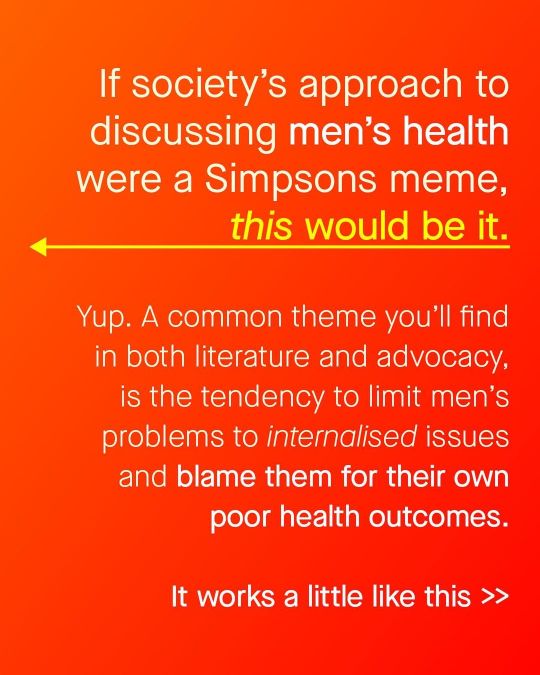
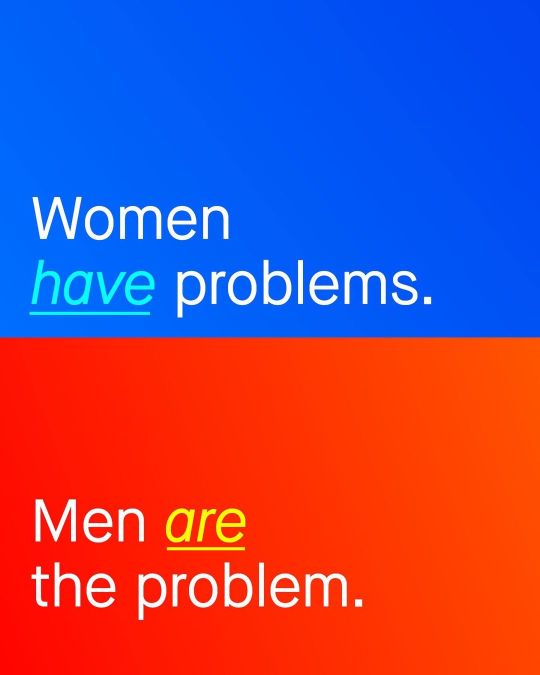
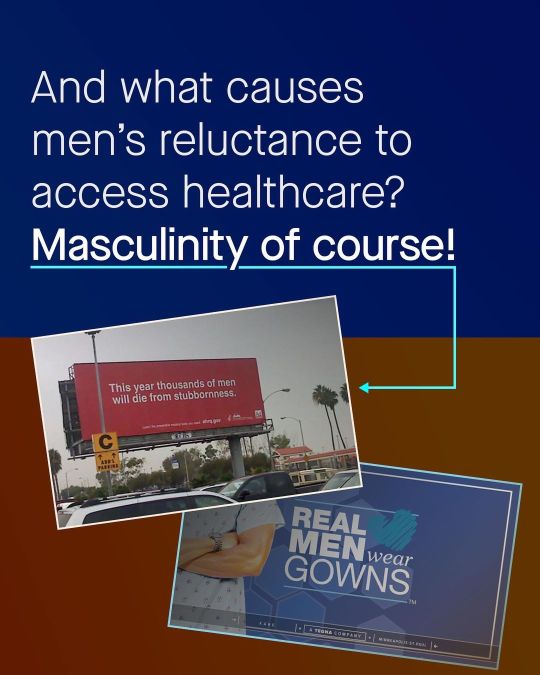
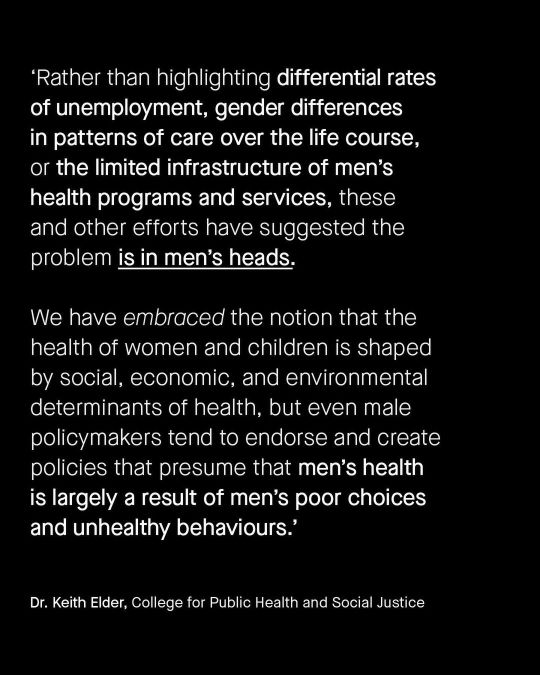
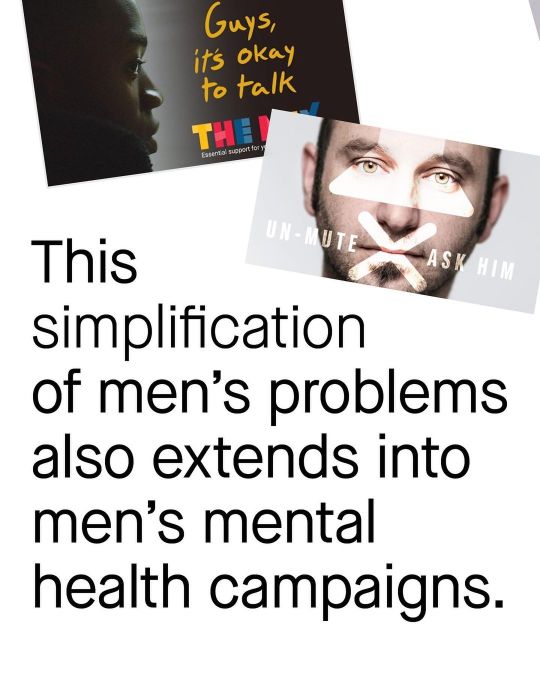
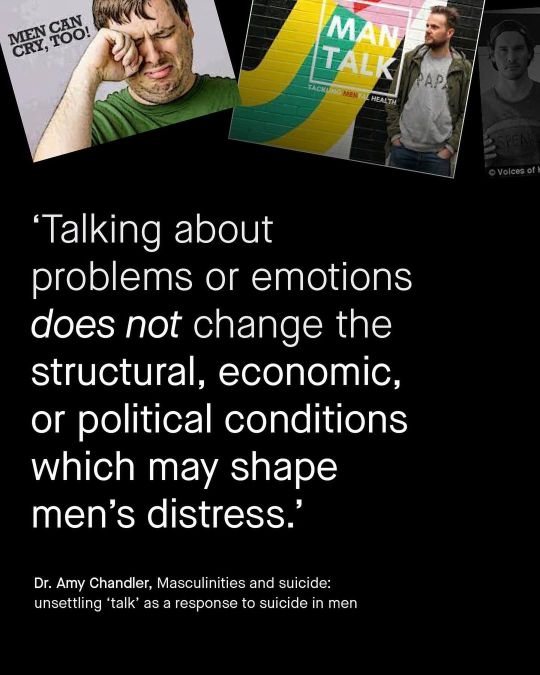
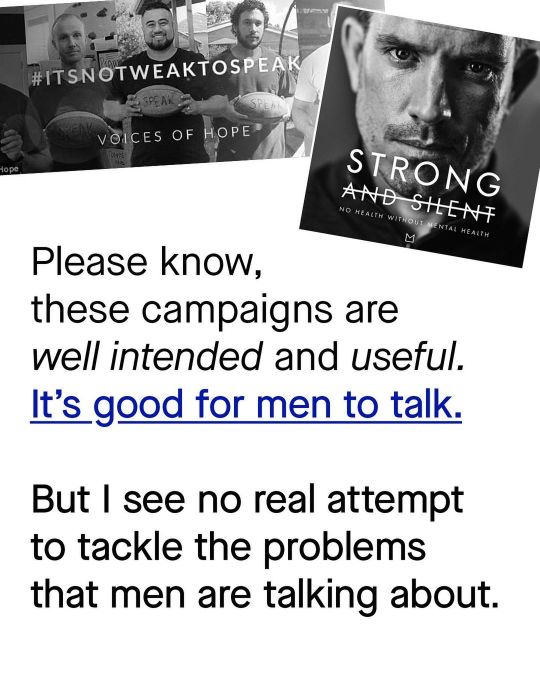
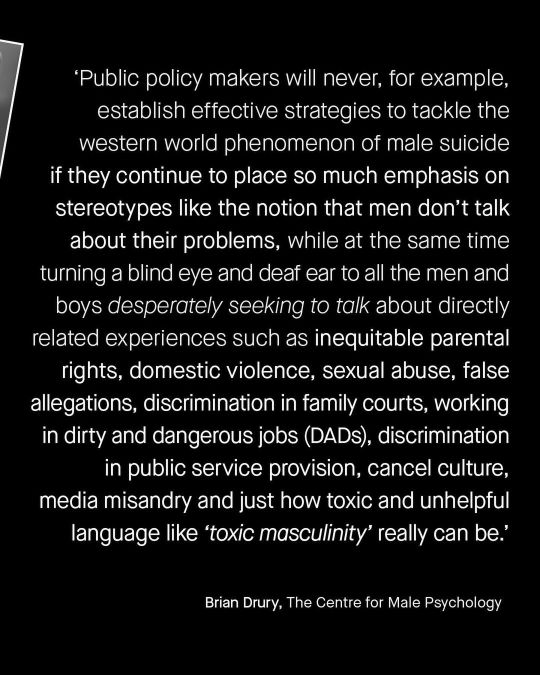
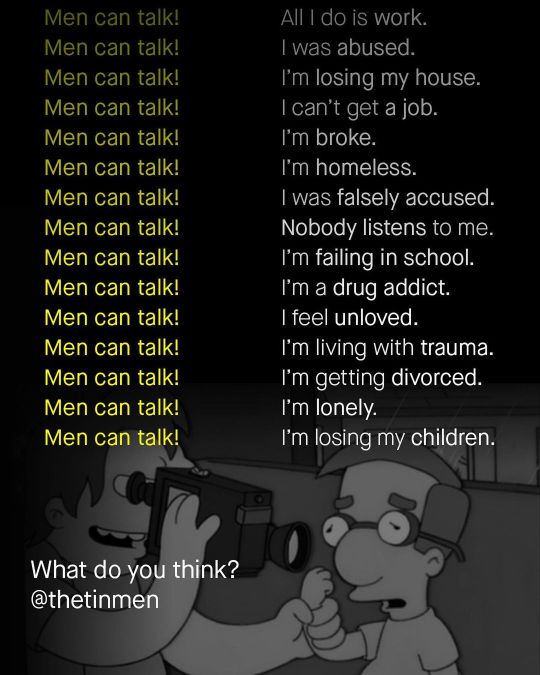
Why does society limit men’s problems to internalised issues, to be solved by a mere change of male mindset?
Do we honestly think tears, talk and de-toxification will somehow solve the systemic problems that shape men’s distress?
Will they miraculously fix the epidemic of men’s deteriorating physical and mental health, and are these things really a substitute for the infrastructural change we so desperately need?
Let’s be real.
Society has opened its eyes and ears to the fact that the health and wellbeing of women is shaped by a complex web of intersected socio-economic issues.
And yet for men, well, their problems are self-inflicted, caused by their own poor choices and shitty attitude, for which they only have themselves to blame.
“Be less toxic, cry more, open up a little and men will be just fine!“
We don’t do this for anyone else.
When women face a problem, we rightly ask: ‘what can we do to change society?’
But when men face a problem, we only ask: ‘what can men do to change themselves?’
It makes no sense.
So, let’s take a look at how we advocate for men’s health, both physically and mentally, and see how (despite its good intentions) it often fails to address the root causes of the problem.
-
Dr. Keith Elder: https://www.ncbi.nlm.nih.gov/pmc/articles/PMC4984782/
Dr. Amy Chandler: https://www.tandfonline.com/doi/full/10.1080/09581596.2021.1908959
Brian Drury: https://www.centreformalepsychology.com/male-psychology-magazine-listings/why-do-the-world-health-organizations-gender-equity-gatekeepers-struggle-to-acknowledge-that-masculinity-can-be-good-for-health
--
The health of men is a glaring omission from the 2016 US presidential campaign conversations. Candidates have discussed the health of veterans, the safe guarding of Medicare, children’s and women’s health, and the repealing of the Patient Protection and Affordable Care Act (ACA) or ObamaCare. But for the two thirds of men who are not veterans or aged 65 years or older, the campaign trail appears silent regarding their health and health care.
The situation is sobering. When comparing the life expectancy at birth of males in the United States to that of males in 21 other highly developed countries (e.g., Australia, Canada, Japan, Sweden, the United Kingdom), males in the US have trailed for more than three decades with the lowest life expectancy. Compared with women, men are three times more likely not to have had a contact with a health care provider for five years, more than twice as likely to have never had contact with a health care provider, and more likely to be uninsured. The gender gaps in life expectancy, premature mortality rates, and use of preventive health care services are persistent and well established, with men faring worse than women on all of these metrics.
The disproportionate burden of disease morbidity and mortality shouldered by men has been supported by the epidemiological and health services literature for decades. However, the unique determinants or patterns of diseases among males across the life course have garnered relatively little policy attention, at least in part because of how we explain men’s health outcomes. The policies and programs to improve men’s health have located the problem as masculinity. Blaming masculinity consists in explaining men’s poorer health and shorter life expectancy than women as the result of psychological traits such as men’s adherence to unhealthy beliefs and norms. For example, the US Agency for Healthcare Research and Quality has had several programs aimed at encouraging men to go to the doctor for preventive screenings and routine treatment such as “Real men wear gowns.” Perhaps they have had no more poignant slogan for a men’s health campaign than the ad from a few years ago that asserted that “This year thousands of men will die from stubbornness.” Rather than highlighting differential rates of unemployment, gender differences in patterns of care over the life course, or the limited infrastructure of men’s health programs and services, these and other efforts have suggested the problem is in men’s heads. We have embraced the notion that the health of women and children is shaped by social, economic, and environmental determinants of health, but even male policymakers tend to endorse and create policies that presume that men’s health is largely a result of men’s poor choices and unhealthy behaviors.
[ Continued... ]
Abstract
An increasingly common way that high rates of male suicide are understood is via men’s ostensibly poorer abilities to talk about – and more generally seek help for – problems in general, and emotional problems specifically. This has led to the development of public mental health campaigns which urge men to ‘speak up’ more often about the problems they face. I argue that both the initial claim, and the enactment of this claim in public mental health campaigns, is problematic, resting on simplistic assumptions about men and gender difference, and serving to detract attention from structural drivers of suicide. Drawing on a narrative analysis of in-depth interviews with ten men who had self-harmed, thought about, or attempted suicide, this paper focuses attention on the content and contexts of ‘talk’. I argue that public health campaigns promoting ‘talk’ in response to male suicide neglect the interpersonal and structural contexts in which talk occurs, including considerations of power and structural inequalities.
[ Continued... ]
#The Tin Men#men's health#suicide#male suicide#mental health#life stressors#men's issues#religion is a mental illness
5 notes
·
View notes
Text
A new cost of living adjustment (COLA) prediction for Social Security has many seniors scratching their heads at how they'll stretch their benefits amid inflation.
The Senior Citizens League (TSCL) just predicted the COLA for 2025, saying beneficiaries can expect a 2.66 percent bump in benefits. Earlier in the year, the estimate was set at 2.6 and 2.4 percent.
If a 2.66 percent boost is implemented, it would likely increase monthly payments by around $50 for most recipients.
While the jump in monthly benefits would be better than the earlier predictions, many seniors were expecting a higher boost to deal with the impacts of inflation.
The Social Security Administration adjusts Social Security payment amounts every year based on the consumer price index, but not everyone feels the change would be enough to get by.
"While COLA payments will increase to offset the effects of inflation, the problem many have with the potential percentage jump is it won't get far enough to meet most of the financial needs of seniors," Alex Beene, a financial literacy instructor at the University of Tennessee at Martin, told Newsweek. "Obviously daily expenses for this age group continue to rise, but the uptick in healthcare costs are putting an additional strain on them, and COLA payments may not be enough to match that uptick."
Seniors will also likely be dealing with higher Medicare Part premiums, according to TSCL.
In the Medicare Trustee report from this month, Part B premiums were predicted to grow by $10.30 a month to a total of $185. That increase is on top of nationwide inflation on groceries, housing and transportation.
"For 2024, the average Social Security benefit rose by $50 and after subtracting $9.80 to cover Medicare Part B Premium increases, the total change in benefits came out to just $40.20 a month. With the forecast of a 2.66 percent COLA for 2025, it appears seniors will continue to suffer financial insecurity as much next year as they have this year," Shannon Benton, executive director of TSCL, said in a statement.
The COLA for each year depends on the rise of the consumer price index for urban wage earners and clerical workers (CPI-W) for the third quarter of the last year. That means the official COLA for 2025 won't be calculated until later in the year.
Many finance experts have questioned whether the CPI-W even stands as a good measure of what seniors can expect inflation wise, with many saying the consumer price index for the elderly (CPI-E)
In 2024, Social Security checks rose by 3.2 percent due to the COLA after a more generous increase of 8.7 percent last year. Many seniors, roughly 71 percent, reported in TSCL 2024 Senior Survey that the increase in household costs they saw went beyond the 3.2 percent jump from the COLA.
"The majority of seniors still feel like their costs are rising faster than those annual adjustments," Michael Ryan, a finance expert and founder/CEO of michaelryanmoney.com, told Newsweek. "So while the COLA certainly helps, it often still doesn't fully cover the real inflation draining seniors' buying power."
Due to the insufficient funds from Social Security for seniors, many will need additional income streams, including a 401(k), IRA or other investment accounts.
"At the end of the day, any COLA increase is better than none to prevent total Social Security stagnation," Ryan said. "But the 2.6 percent projection for 2025 underscores the need for policymakers to reexamine whether metrics like CPI-E would better serve seniors by more accurately reflecting their unique spending habits. We just want to make sure government benefits retain as much purchasing power over time as possible on those fixed incomes."
2 notes
·
View notes
Text
Personal: Disability Stuff
Tuesday was one of the disability services assessments I am required to do every year. We mostly talked about my arm. There was the inevitable dementia test, of course. Even though obviously the test is super easy, I always end up poking at my brain after, as if the act of being made to take one makes me feel less competent.
We won't know for a bit how this effects Goth Millennial's or Cleaner hours, but Goth Millennial is assured not to lose any, according to the assessor. They may also get Honest Contractor (Some of you may remember him for such episodes as the time the city paid a guy to fix a bunch of things in my house the Winter of 2019-2020, or that time we lost power to a third of the apartment between Christmas and New Year because the builder wired everything wrong, and he fixed it for free with a bit of wire and a paper clip.) to come put a pull bar by the toilet so I can use my left hand to get up on a bad hip day. There is no grab bar now, but a bit of wall juts out and I can use it a little with my right arm on a good shoulder day, but I need a long term solution. Medicare advantage FTW.
Reminder: For those of you in the US in need of health care, or who want a better plan, right now is open enrollment and there are actually people who will help you get better healthcare who you do not have to pay through a government program.
5 notes
·
View notes
Text
I had an MRI of my back done recently.
They had to do my entire back because they aren’t sure what’s causing my symptoms (my DO does but no one listens to how compression in the cranium can affect positional problems for other parts of your body but that’s not the point of this.)
They charged my insurance $21,000. For an hour and a half worth of MRI scans.
To put this into perspective, Medicare apparently has found that it costs $75,000 on average to run an MRI machine facility for a month. This includes electricity/utilities, machine upkeep, and staffing. Theoretically, they apparently thought they could meet those operating costs and turn a profit with just three patients like me. Thankfully, these money grubbing scumbags were not able to do so.
In the end, the hospital imaging system that did my MRI got $600. With three segments of spine at $200 a pop, this aligns with the Medicare average of $200–$500 per scan depending on the part of the human body you’re scanning.
Before you say, “See!! Socialized medicine would fix this!!” Imma have to stop you right there.
Socialized medicine is just another monopolized, inefficient system. See: the NHS having over 600k outstanding primary care requests last year, the largest amount they’ve ever had. The French going back to offering private healthcare—which is better and is what my family members have opted into now that they’ve moved back—to ease the systemic burden. The Netherlands considering getting rid of their nationalized health system because they’re drowning in debt.
None of this is going to get better until we remove the monopoly created by the insurance companies and health system administrators colluding with each other to get rich off the suffering of others. We currently have a monopoly on healthcare in the US because of this system. Nationalized healthcare is just another abused monopoly.
If we can get back to healthcare markets that have more freedom—with appropriate oversight—then some of this should stop. None of that can happen until the greediest among us face justice.
11 notes
·
View notes
Text
So you want to fix Social Security, how about…… merchandising
Yes that is right let’s sell t-shirts with cute sayings about being old and baseball caps saying I’m old, I have medicare with a new spruced up logo.
Why not? It is certainly the American way.
Okay maybe not, but certain people in Congress are wanting to raise the age for full retirement to 70 to help stave off Social Security running low on funds.
Interesting that the very same people who can receive a pension up to 80% of their last salary, (depends on years served, age) and because of their salary as a Representative they receive higher social security payments than the average person in general receives want to save social security by hurting the people who need it most.
And think about this; one of the reasons people don’t earn much through their social security is due to lack of wage growth while they were working. So the last 50 or 60 years of slow wage growth and not just relative to the rate of inflation has hurt the social security fund and hindered the amount of benefits people receive when they start taking their social security payments. Did you need another reason to be hissed off that the federal minimum wage is squat ($7.25) and hasn’t changed in how long? (2009)
Yet our elected officials who are paid by your tax dollars are receiving significantly more than the people they are elected to serve with pension funds, yet most Americans do not have a pension from their employer anymore so need social security as a basis for their retirement income. And we are told we have workplace retirement savings plans for us to save which is true, but it helps if we earn enough to save or as all these good politicians will tell us, make the sacrifices to save more. Sounds like a good idea, except heath care costs are growing faster than inflation, housing costs are exploding, so yep we have all this extra money to save.
And your elected officials also have a savings plan through the Federal government and you guessed it they also receive a “company match” paid by your tax dollars.
So most Americans have suffered through anemic wage growth, high costs that eat into savings rates, and a social security plan that is the ripe to be cut to balance the federal budget.
And somehow or another these elected officials keep getting re-elected over and over again to the point everyone wants term limits, but won’t discuss the real issue of holding our elected officials accountable to us and representing us. And some of them earn over $100,000 in pension, receive higher than average social security and have a savings plan where money is deposited for them. And the icing on the cake, better healthcare.
And then there are some that want Wall Street to manage the Social Security Trust fund. Sure, put the people who hoard wealth in charge of the average person’s turnip squeezed life blood. That sounds like it will work…. for them. And they just love supporting decent wages for workers, too. uh…………… Well they should.
Maybe hocking t-shirts and caps is the solution and you can do that until you are 80 if some in Congress have their way.
Yet if you are a regular reader you know that there are other ideas espoused that at least think about you and I.
2 notes
·
View notes
Text
Corporate Bullshit

I'm coming to BURNING MAN! On TUESDAY (Aug 27) at 1PM, I'm giving a talk called "DISENSHITTIFY OR DIE!" at PALENQUE NORTE (7&E). On WEDNESDAY (Aug 28) at NOON, I'm doing a "Talking Caterpillar" Q&A at LIMINAL LABS (830&C).

Corporate Bullshit: Exposing the Lies and Half-Truths That Protect Profit, Power, and Wealth in America is Nick Hanauer, Joan Walsh and Donald Cohen's 2023 book on the history of corporate apologetics; it's great:
https://thenewpress.com/books/corporate-bullsht
I found out about this book last fall when David Dayen reviewed it for the The American Prospect; Dayen did a great job of breaking down its thesis, and I picked it up for my newsletter, which prompted Hanauer to send me a copy, which I finally got around to reading yesterday (I have gigantic backlog of reading):
https://pluralistic.net/2023/10/27/six-sells/#youre-holding-it-wrong
The authors' thesis is that the business world has a well-worn playbook that they roll out whenever anything that might cause industry to behave even slightly less destructively is proposed. What's more, we keep falling for it. Every time we try to have nice things, our bosses – and their well-paid Renfields – dust off their talking points from the last go-round, do a little madlibs-style search and replace, and bust it out again.
It's a four-stage plan:
I. First, insist that there is no problem.
Enslaved people are actually happy. Smoking doesn't cause cancer. Higher CO2 levels are imaginary and they're caused by sunspots and they're good for crop yields. The hole in the ozone layer is only a problem if you foolishly decide to hang around outside (this is real!).
II. OK, there's a problem, but it's your fault.
An epidemic of on-the-job maimings is actually an epidemic of sloppy workers. A gigantic housing crash is really a gigantic cohort of greedy, feckless borrowers. Rampant price gouging is actually a problem of too much "spending power" (that is, "money") in the hands of working people.
III. Any attempt to fix this will make it worse.
Equal wages for equal work will cause bosses to fire women and people of color. Protecting people with disabilities will cause bosses to fire disable people. Minimum wages will cause bosses to buy machines and fire "unskilled" workers. Gun control will only increase underground gun sales. Banning carcinogenic pesticides will end agriculture as we know and we'll all starve to death.
IV. This is socialism.
Income tax is socialism. Estate tax is socialism. Medicare and Medicaid are socialism. Food stamps are socialism. Child labor laws are socialism. Public education is socialism. The National Labor Relations Act is socialism. Unions are socialism. Social security is socialism. The Fair Labor Standards Act is socialism. Obamacare is socialism. The Civil Rights Act is socialism. The Occupational Health and Safety Act is socialism. The Family Medical Leave Act is socialism. FDR is a socialist. JFK is a socialist. Lyndon Johnson is a socialist. Carter is a socialist. Clinton is a socialist. Obama is a socialist. Biden is a socialist (Biden: "I beat the socialist. That's how I got the nomination").
Though this playbook has been in existence since the nation's founding, the authors point out that from the New Deal until the Reagan era, it didn't get much traction. But starting in the Reagan years, the well-funded network of billionaire-backed think-tanks, endowed economics chairs, and latter-day propaganda vehicles like Prageru breathed new life into these tactics.
We can see this playing out right now as the corporate world scrambles for a response to the Harris campaign's proposal to address price-gouging. Reading Matt Stoller's dissection of this response, we can see the whole playbook on display:
https://www.thebignewsletter.com/p/monopoly-round-up-price-gouging-vs
First, corporate apologists insisted that greedflation didn't exist, despite the fact that CEOs kept getting on earnings calls and boasting to their investors about how they were using the excuse of inflation to jack up prices:
https://pluralistic.net/2023/03/11/price-over-volume/#pepsi-pricing-power
Or the oil CEOs who boasted that the Russian invasion of Ukraine gave them cover to just screw us at the pump:
https://pluralistic.net/2022/03/15/sanctions-financing/#soak-the-rich
There are all these out-in-the-open commercial entities whose sole purpose is to "advise" large corporations about their prices, which is just a barely disguised euphemism for price-fixing, from meat-packing:
https://pluralistic.net/2023/10/04/dont-let-your-meat-loaf/#meaty-beaty-big-and-bouncy
To rents:
https://pluralistic.net/2024/07/24/gouging-the-all-seeing-eye/#i-spy
That's stage one: "there's no problem." Stage two is "it's your fault." That's Larry Summers and co insisting that a couple of stimulus checks a couple years ago are responsible for inflation, because it gave you too much "buying power," and so the only possible fix is to jack up interest rates and trigger mass layoffs and sharp wage decreases across the economy:
https://pluralistic.net/2022/12/14/medieval-bloodletters/#its-the-stupid-economy
Stage three is "any attempt to fix this will make it worse." When Isabella Weber pointed out that there was a long history of price-controls being used to fight price-gouging, corporate apologists lost their minds and brigaded her, calling her all kinds of nasty names and insisting that her prescription didn't even warrant serious discussion, because any attempt to control prices would destroy the economy:
https://www.theglobeandmail.com/podcasts/lately/article-the-millennial-economist-who-took-on-the-world/
You may recognize this as cousin to the response to rent control proposals, which inevitably trigger a barrage of economists screaming that this will not work and will actually reduce the housing supply and drive up prices, which is true, provided that you ignore all evidence and history:
https://pluralistic.net/2023/05/16/mortgages-are-rent-control/#housing-is-a-human-right-not-an-asset
And stage four is "this is socialism." Look, I am a literal card-carrying member of the Democratic Socialists of America and I can assure you, Kamala Harris is not a socialist (and more's the pity). But that didn't stop the most eminently guillotineable members of the investor class from hair-on-fire, ALL-CAPS denunciations of the Harris proposal as SOCIALISM and Harris herself as a COMMUNIST:
https://twitter.com/Jason/status/1824580470052725055
The author's thesis is that by naming the playbook and giving examples of it – for example, showing how the "proof" that minimum wage increases will destroy jobs was also offered as "proof" not to abolish slavery, ban child labor, add fireproofing to textile factories, and pay women and Black people the same as white guys – we can vaccinate ourselves against it.
Certainly, we've reached a moment where the public is increasingly skeptical of claims that we can't fix anything because the economists say that this is the best of all possible worlds, and if that means that we're all going to boil to death in our own skin, so be it:
https://pluralistic.net/2022/10/27/economism/#what-would-i-do-if-i-were-a-horse
In other words, after 40 years of subordinating politics to economics, there's a resurgence of belief in politics – that is, doing stuff – rather than hunkering down and waiting for the technocrats to fix everything:
https://www.programmablemutter.com/p/seeing-like-a-matt
Corporate Bullshit is a brisk and bracing read – I got through it in about an hour in my hammock yesterday – and, in laying out the bullshit playbook's long history of nonsensical predictions and pronouncements, it does make a very good case that we should stop listening to people who quote from it.

If you'd like an essay-formatted version of this post to read or share, here's a link to it on pluralistic.net, my surveillance-free, ad-free, tracker-free blog:
https://pluralistic.net/2024/08/19/apologetics-spotters-guide/#narratives
#pluralistic#narratives#lakoff#joan walsh#david cohen#nick hanauer#apologetics#bullshit#history#books#reviews#gift guide
244 notes
·
View notes
Text
Getting Started with the NDIS, Part III
Finished the appointment with the NDIS Local Area Coordinator, who gave me a bit of a breakdown of what the various items in the various categories for my plan are.
Under "core supports" I get 4 hours a week of domestic support (housework, gardening, cooking, cleaning etc). I also get 5 hours a week of social support, which means if I need someone to come along and be my buddy at a social Thing, that's where the money comes from. This means now I need to find some social Things to need a buddy for. Yeep. I think the first few hours are going to be things like "clothes shopping" and "getting my eyes tested" and other such long-overdue tasks that I’ve been putting off due to dislike of crowds. There's a budget for consumables (bits and pieces recommended by allied health professionals as necessary for this and that - examples given were things like non-slip bath mats, or particular kitchen appliances). The transport money is getting paid directly to my bank account on a fortnightly basis - it's essentially petrol money, which means yeah, the NDIA is paying for 2/3 of each tank of fuel I buy - which means I can afford to do other things to the car with the money I’m putting aside for it each fortnight, like paying for some well-overdue new tyres.
Under capacity building, I get 30 hours of psychology time, which is essentially 26 fortnightly psychologist visits a year, and an extra four hours of crises, report writing, or whatever. Even if I knock that down to "one hour of direct service generates one hour of indirect report writing" (which is probably a pretty fair estimate, given what the NDIS requires by way of reporting from the people they're paying money to) that's fifteen psych visits a year, which is one a month plus three spares for crises. Meanwhile, Medicare will cover a total of 10 psych visits per year (which is about one every six weeks - it's a maintenance schedule, not an improvement schedule; admittedly, Medicare doesn't demand the same level of reporting back and forth). I also get 10 hours of designated physiotherapy time (at least some of that is going to be for the initial assessment, to tell them - and me - what needs fixing and what I need help with), plus another 20 hours of flexible therapy time (10 hours of which is allocated to an OT for a Functional Capacity Assessment) which can be allocated wherever is necessary.
Now, as with all government grants (which is what NDIS money is) there's a catch: you have to use it all up in order to get the same amount of funding next year. The government wants this money to get out and about in the community and make friends with lots of people (I pay it to the allied health people; they use it to pay their bills or their salary; it then gets paid on to someone else, etc, etc) rather than sit huddled in a silo feeling sorry for itself because it's all lonely. This presents its own problems for me at the moment - I have no idea about what kinds of services are available, how I'd go about accessing them and so on.
This is where the support coordination side of things comes into play. A support coordinator is the person who connects the person with the money (me) with the people who can provide the services they need (PTs, OTs, support workers and so on) and who essentially has a list of "these are the good ones, these are the ones to steer clear of" and so on at their fingertips. I've made an outreach to one of the organisations near me which provides NDIS support coordination, and I'm hoping they'll be able to get back to me before the new year (so I can get the ball rolling with this plan as soon as possible) and give me a hand with support coordination. Fortunately, I have some money set aside in my "capacity building" funds for that as well.
We shall see how my life changes (hopefully all for the better) as things go along.
3 notes
·
View notes
Text
This post isn't wrong, but it's missing a large chunk of the history that actually gives us a path towards fixing it. Hi, I'm Baron, and I'm currently studying political science and public policy, and working in a class around healthcare policy. The US system is really about 4 systems of health insurance and healthcare providers. You have veteran's benefits, a form of socialized healthcare where the government builds hospitals and employs doctors. Then you have the socialized insurance programs, Medicare (for people 65 and older) and Medicaid (for people who fall below a certain income level), where the government is the insurer, but the actual service of healthcare are done by private doctors and hospitals. Everyone else in the US is either uncovered or covered by the private health insurance market, through a marketplace or through their employer. The majority of Americans get health benefits through an employer.
Now the history behind how we got here, with a fragmented system-I'm pulling a lot on a paper by Jill Quadagno, "Why the United States Has No National Health Insurance: Stakeholder Mobilization against the Welfare State, 1945-1996". Quadagno traces the history of employer-sponsored benefits back to the late 1940s when federal legislation rolled back many of the gains unions got, and in response the Congress of Industrial Organizations expelled many communist-controlled unions. Shortly after this organized labor began to organize particularly for employer-sponsored healthcare benefits as a way to provide value to people who worked in a union shop, instead of turning towards a national healthcare program.
However, they couldn't get these companies to cover retired employees. This created one of the motivations for Medicare-insurance for older adults isn't profitable and isn't covered elsewhere. So the block of people who worked together to get a (limited) national insurance program were a coalition of older adults who marched by the thousands and organized labor groups. These forces joined together to lobby and also organized to make sure Medicare supporters got re-elected. As Quadagno points out, "The Democrats won the Senate and the House by a wide margin, and no incumbent, Republican or Democrat, who supported Medicare lost."
So you want national healthcare? Join a union. Build wide coalitions. Get progressives elected to government. The forces behind this involved a powerful organized labor movement and finding a sympathetic national face for the issue-we built those before, and we can build them again.

We need to end lobbyism as we know it. Corporate bribery is the worst way to provide a human right like health care.
Sad that $800 million/year in bribes costs us 650 billion/year in savings.
22K notes
·
View notes
Text
Employee Pay Calculation: From Hourly Wage to Annual Salary
Employee pay calculation is the process of determining an employee's earnings based on their hourly wage, salary, or other forms of compensation. It is an essential aspect of payroll processing and is used to calculate an employee's gross income, deductions, taxes, and net income. In this article, we will explore the different components of employee pay calculation, from hourly wage to annual salary.
Hourly Wage
An hourly wage is the amount of money an Kalkulimi i Pages earns per hour of work. It is a common form of compensation for hourly employees, who are paid based on the number of hours they work. To calculate an employee's hourly wage, you can divide their annual salary by the number of hours they work per year. For example, if an employee earns 40,000 per year and works 2,080 hours per year, their hourly wage would be 19.23 per hour.

Annual Salary
An annual salary is the amount of money an employee earns per year. It is a common form of compensation for salaried employees, who are paid a fixed amount of money per year regardless of the number of hours they work. To calculate an employee's annual salary, you can multiply their hourly wage by the number of hours they work per year. For example, if an employee earns 25 per hour and works 2,080 hours per year, their annual salary would be 52,000 per year.
Gross Income
Gross income is the total amount of money an employee earns before any deductions or taxes are taken out. It includes their hourly wage or annual salary, as well as any overtime pay, bonuses, or other forms of compensation. To calculate an employee's gross income, you can multiply their hourly wage by the number of hours they work per pay period, or divide their annual salary by the number of pay periods per year.
Deductions and Taxes
Deductions and taxes are amounts of money that are taken out of an employee's paycheck to pay for various expenses and obligations. The most common deductions include federal income tax, state income tax, Social Security tax, Medicare tax, health insurance premiums, and retirement plan contributions. To calculate an employee's deductions and taxes, you can use a payroll calculator or consult with a tax professional.
Net Income
Net income, also known as take-home pay, is the amount of money an employee takes home after all deductions and taxes have been taken out. It is the amount of money that is available to the employee to spend or save as they wish. To calculate an employee's net income, you can subtract their deductions and taxes from their gross income.
Pay Frequency and Pay Periods
Pay frequency refers to how often an employee is paid, while pay periods refer to the specific periods of time for which an employee is paid. Common pay frequencies include biweekly, weekly, and monthly, while pay periods can vary depending on the company's policies and the employee's work schedule. To calculate an employee's pay, you can divide their annual salary by the number of pay periods per year, or multiply their hourly wage by the number of hours they work per pay period.

Calculating Employee Pay
Calculating employee pay involves determining an employee's gross income, deductions, taxes, and net income. It is a complex process that requires a thorough understanding of payroll laws and regulations, as well as the company's policies and procedures. To ensure accuracy and compliance, it is recommended that employers use a payroll calculator or consult with a payroll professional.
Conclusion
In conclusion, employee pay calculation is a critical aspect of payroll processing that involves determining an employee's earnings based on their hourly wage, salary, or other forms of compensation. By understanding the different components of employee pay calculation, employers can ensure accuracy and compliance, while employees can better manage their finances and make informed decisions about their compensation.
0 notes